Allianz Bundle
Can Allianz Maintain Its Dominance in the Cutthroat Financial World?
In an era of rapid technological advancements and shifting consumer expectations, Allianz SE, a global financial services leader, faces a dynamic and challenging competitive landscape. Founded in 1890, Allianz has evolved from a modest insurer to a global powerhouse, but its continued success hinges on its ability to navigate intense competition. This article provides a comprehensive analysis of Allianz's competitive environment, offering crucial insights for investors, analysts, and business strategists.
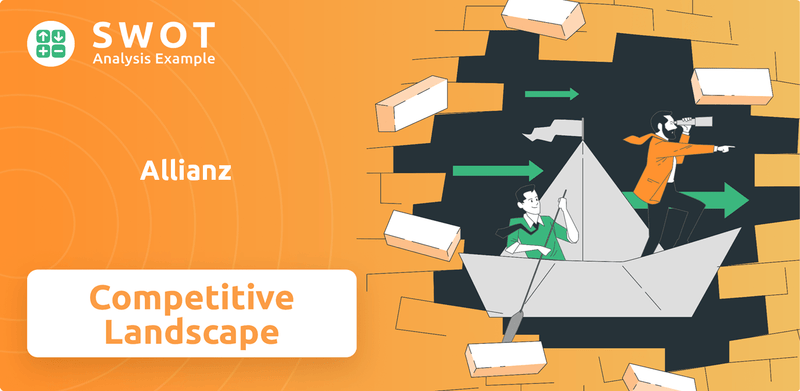
This exploration of the Allianz SWOT Analysis will identify its main competitors, analyze its market share, and assess its strategic positioning within the global insurance market. Understanding the Allianz competitive landscape is crucial for anyone seeking to understand the financial services competition and the forces shaping the future of the insurance industry. We'll delve into Allianz's financial performance analysis, exploring its competitive advantages and the challenges it faces in a constantly evolving sector.
Where Does Allianz’ Stand in the Current Market?
Allianz SE holds a prominent position in the global insurance and asset management sectors. The company's core operations encompass property-casualty insurance, life and health insurance, and asset management services through Allianz Global Investors and PIMCO. This diversified business model allows Allianz to serve a wide range of customer needs and navigate various market conditions effectively.
The value proposition of Allianz centers on providing comprehensive financial solutions, risk management, and investment services to individuals and businesses worldwide. Allianz emphasizes financial stability, innovation, and customer-centricity to maintain its competitive edge. Allianz's commitment to digital transformation further enhances its value proposition by improving operational efficiency and customer experience.
As of the full-year results for 2024, Allianz reported total revenues of approximately 161.7 billion euros, highlighting its significant scale and market presence. The company is a top-tier global insurer, consistently ranking among the top five worldwide by various metrics, including gross written premiums. Allianz's strong brand recognition and extensive distribution networks contribute to its prominent position across numerous key markets.
Allianz consistently ranks among the top global insurers. Its substantial market share reflects its strong presence in key insurance markets worldwide. The company’s financial strength and diverse product offerings support its leading position in the insurance industry.
Allianz has a broad geographic footprint, with a strong presence in Europe, North America, Asia-Pacific, and emerging markets. This diversification helps mitigate regional economic downturns. Allianz's global reach allows it to tap into diverse growth opportunities.
Allianz offers a comprehensive suite of insurance products, including property-casualty, life, and health insurance, along with asset management services. This diversified product portfolio caters to a wide range of customer needs. The company's product offerings are key to its competitive advantage.
Allianz demonstrates robust financial health, with a solvency ratio of 206% as of Q4 2024, well above regulatory requirements. This strong capital buffer indicates financial stability. Allianz's solid financial performance supports its ability to invest in growth and innovation.
Allianz's competitive advantages include its global brand recognition, extensive distribution networks, and diversified product offerings. The company's strategic initiatives focus on digital transformation, customer-centricity, and expansion in high-growth markets. Allianz continues to invest in technology to streamline operations and improve customer experience.
- Allianz's strong financial performance allows it to invest in growth and innovation, enhancing its competitive position.
- The company's focus on digital transformation streamlines operations and improves customer experience.
- Allianz's global presence and diversified product portfolio help mitigate risks and capture growth opportunities.
- Strategic partnerships and acquisitions support Allianz's expansion and market share growth.
Allianz SWOT Analysis
- Complete SWOT Breakdown
- Fully Customizable
- Editable in Excel & Word
- Professional Formatting
- Investor-Ready Format
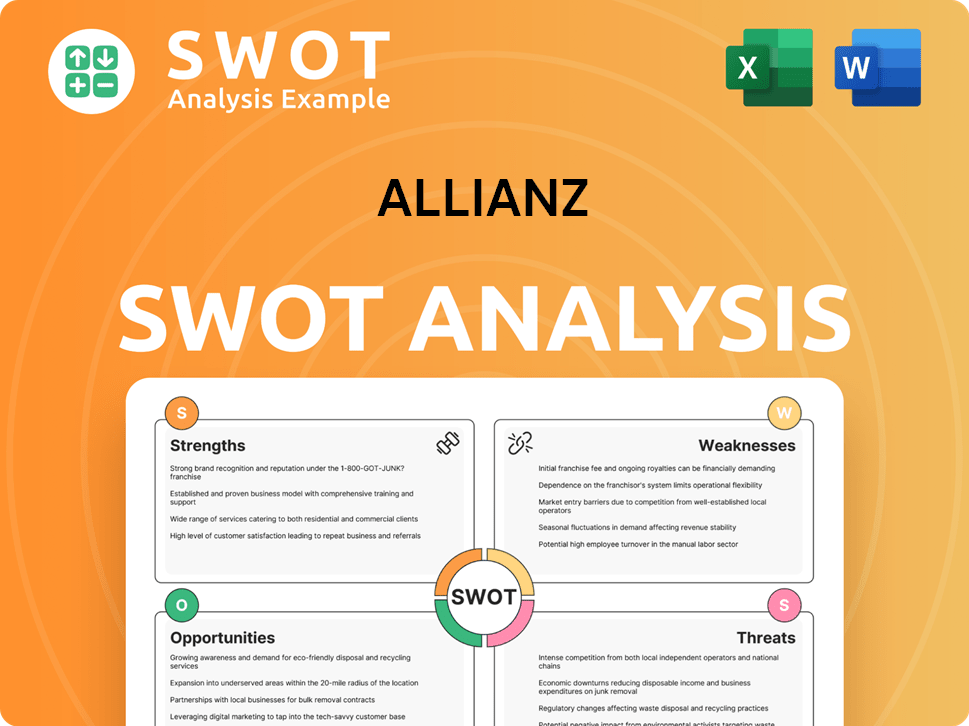
Who Are the Main Competitors Challenging Allianz?
The competitive landscape for Allianz SE is complex, encompassing a wide array of both direct and indirect competitors across its insurance and asset management sectors. This environment is shaped by established global players, emerging insurtech startups, and evolving market dynamics. Understanding these competitors and their strategies is crucial for assessing Allianz's market position and future prospects.
Allianz faces competition in the global insurance market from large multinational insurers, as well as in the asset management sector, where it competes with major global asset managers. Additionally, the rise of insurtech companies and the ongoing consolidation within the industry are further reshaping the competitive dynamics. These factors require Allianz to continually adapt and innovate to maintain its market share and competitiveness.
Allianz's ability to navigate this competitive environment is critical for its financial performance and long-term success. Analyzing the strategies of key competitors, understanding market trends, and adapting to technological advancements are essential for Allianz to maintain its position in the global financial services industry.
Key direct competitors for Allianz in the insurance market include AXA, Generali, Zurich Insurance Group, and Munich Re. These companies offer similar insurance products and services, competing with Allianz in various global markets.
In asset management, Allianz Global Investors and PIMCO compete with BlackRock, Vanguard, Amundi, and UBS Asset Management. These firms offer a range of investment strategies and compete for market share in the global asset management industry.
Insurtech companies like Lemonade and Wefox are disrupting the traditional insurance landscape. They leverage technology for personalized products, efficient claims processing, and direct-to-consumer models, posing a challenge to Allianz's established distribution channels.
AXA, a major French multinational insurer, competes with Allianz globally, particularly in Europe, North America, and Asia. They offer similar insurance products and services, often vying for global corporate accounts and individual retail segments.
Generali, an Italian insurer, is a strong competitor, especially in Southern Europe. They challenge Allianz in various national markets through extensive agent networks and diverse product offerings.
Zurich Insurance Group competes globally in commercial and personal lines, often vying for market share in specific regions and specialized insurance solutions. They are a significant player in the global insurance market.
The competitive landscape is constantly evolving. Allianz must adapt to new challenges and opportunities. For example, in 2024, the global insurance market is projected to reach approximately $7 trillion in direct written premiums. Allianz, with its strong global presence, competes for a significant portion of this market. Furthermore, the rise of insurtech has led to increased competition, with these companies attracting a growing share of the market. Understanding the strategies of these competitors is crucial for Allianz's strategic planning. For more insights into the financial aspects of Allianz, you can explore the Owners & Shareholders of Allianz.
Allianz's competitive advantages and challenges are influenced by several factors.
- Market Share: Allianz holds a significant market share in several regions, but competition from established players and new entrants impacts its position.
- Product Innovation: The ability to innovate and offer new insurance products and investment strategies is crucial for attracting and retaining customers.
- Digital Transformation: Investing in digital technologies to improve customer experience, streamline operations, and enhance distribution channels is essential.
- Geographic Diversification: Allianz's global presence allows it to diversify risks and tap into various markets, but it also faces unique challenges in each region.
- Financial Performance: Allianz's financial health, including its profitability and solvency, is a key factor in its ability to compete effectively.
Allianz PESTLE Analysis
- Covers All 6 PESTLE Categories
- No Research Needed – Save Hours of Work
- Built by Experts, Trusted by Consultants
- Instant Download, Ready to Use
- 100% Editable, Fully Customizable
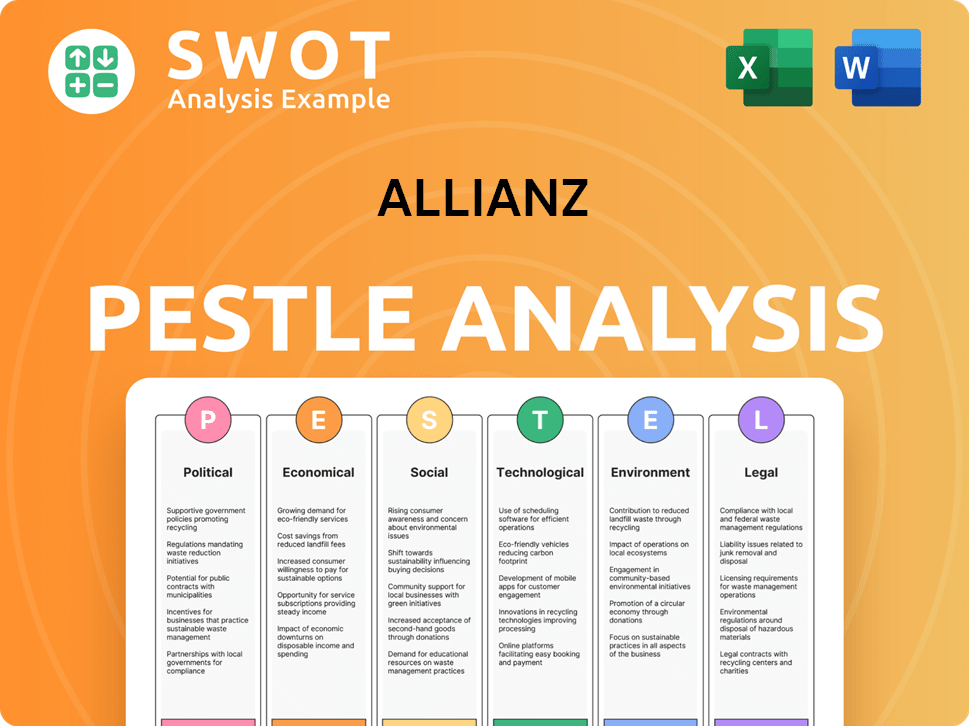
What Gives Allianz a Competitive Edge Over Its Rivals?
Understanding the competitive landscape of Allianz involves recognizing its key strengths and how it positions itself against rivals in the global insurance and financial services market. The company has a long-standing reputation, which fosters trust and loyalty among its customers. This strong brand recognition is a significant advantage in a sector where trust is paramount. Allianz's vast global presence and diverse distribution network, including agents, brokers, and digital channels, enable it to reach a broad customer base worldwide, giving it a competitive edge.
Allianz's competitive strategy is also shaped by its ability to leverage economies of scale, allowing it to offer competitive pricing, particularly in mature markets. Its expertise in risk management, sophisticated underwriting, and actuarial science contribute to its strong financial performance. Furthermore, the asset management arm, PIMCO, provides a distinct competitive edge through its investment capabilities and diverse investment solutions, attracting both institutional and retail clients.
Allianz is actively investing in technological advancements, including AI and data analytics, to enhance customer experience and streamline operations. This commitment to digital transformation is aimed at solidifying its position against digitally native competitors. These competitive advantages are largely sustainable due to their embedded nature in Allianz's operations and long-standing relationships, though they require continuous adaptation and investment to counter evolving industry dynamics and competitive pressures. For a deeper dive into the company's financial structure, consider exploring the Revenue Streams & Business Model of Allianz.
Allianz benefits from a strong brand reputation, which is crucial in the insurance industry. Its extensive global network, encompassing various channels, allows it to reach a vast and diverse customer base. This broad presence helps maintain and grow its market share in the global insurance market.
Economies of scale enable Allianz to offer competitive pricing. Its expertise in risk management, honed over decades, is a critical advantage. This allows for accurate risk assessment and pricing, contributing to strong financial results.
PIMCO, Allianz's asset management arm, provides a distinct competitive edge. Allianz is investing in AI and data analytics to enhance customer experience and streamline operations. This digital transformation is key to staying competitive.
These advantages are largely sustainable due to their embedded nature within Allianz's operations. Continuous adaptation and investment are necessary to address evolving industry dynamics. The company focuses on innovation in insurance products and strategic partnerships.
Allianz's competitive advantages include its strong brand, global distribution, and operational efficiency. Its expertise in risk management and asset management through PIMCO also significantly contribute to its success. The company's digital transformation efforts are aimed at enhancing customer experience and streamlining operations.
- Brand Reputation: A century-long reputation builds customer trust and loyalty.
- Global Reach: Extensive distribution networks across various channels.
- Risk Management: Sophisticated underwriting and actuarial capabilities.
- Asset Management: PIMCO's investment prowess attracts clients.
- Digital Transformation: Investments in AI and data analytics for innovation.
Allianz Business Model Canvas
- Complete 9-Block Business Model Canvas
- Effortlessly Communicate Your Business Strategy
- Investor-Ready BMC Format
- 100% Editable and Customizable
- Clear and Structured Layout
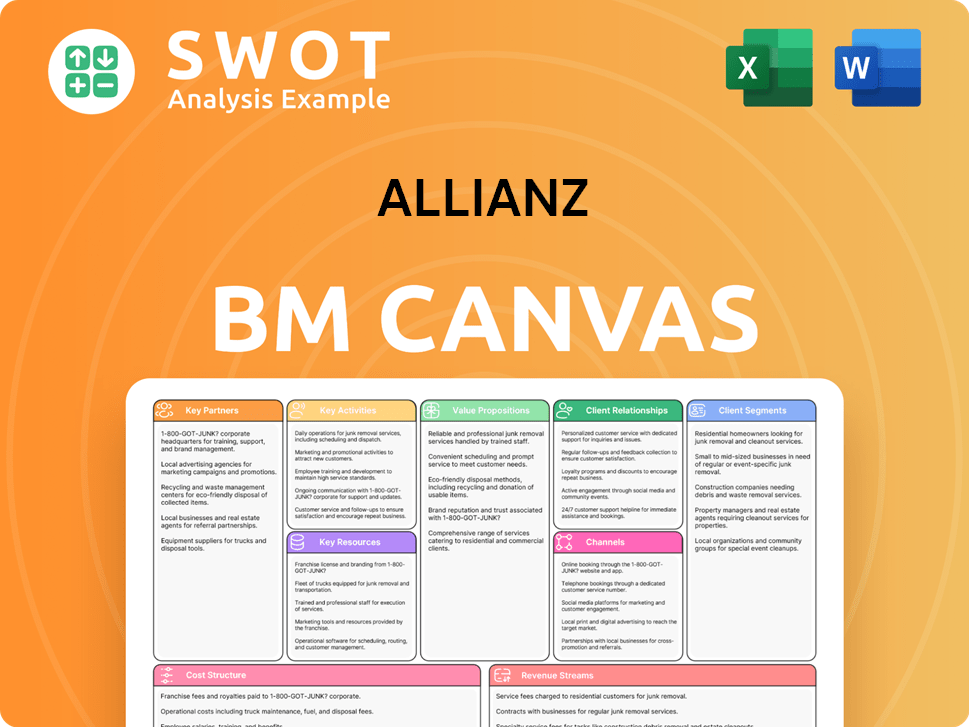
What Industry Trends Are Reshaping Allianz’s Competitive Landscape?
The global financial services sector is currently experiencing significant shifts, creating both challenges and opportunities for companies like Allianz. These transformations are driven by technological advancements, evolving regulatory landscapes, and changing consumer expectations. Understanding these trends is crucial for assessing the Allianz competitive landscape and its future prospects. The Allianz market share and its position in the global insurance market are directly influenced by how effectively it navigates these dynamics.
Allianz faces a complex mix of competitive pressures and growth opportunities. The rise of insurtechs and the potential entry of tech giants into the insurance space pose threats. However, emerging markets and product innovation provide avenues for expansion. Allianz's strategic decisions, including partnerships and digital transformation, will be key to maintaining and enhancing its market position. A thorough insurance industry analysis reveals the need for adaptability and strategic foresight.
Technological advancements such as AI, machine learning, and blockchain are reshaping product development and claims processing. Regulatory changes, including stricter data privacy laws, are increasing compliance costs. Consumers now demand more digital and flexible services, pushing insurers to adapt their business models. These trends are critical for understanding the Allianz competitive landscape.
Intensified competition from insurtechs offering innovative solutions and the potential entry of large tech companies pose significant threats. Economic downturns and low-interest rates could impact investment returns. Adapting to evolving consumer demands and regulatory changes requires continuous investment and strategic agility. These challenges directly affect Allianz competitors.
Emerging markets offer significant growth potential due to low insurance penetration rates. Product innovation, particularly in areas like cyber insurance and climate risk solutions, can create new revenue streams. Strategic partnerships with technology firms can accelerate digital transformation and market reach. These opportunities can help Allianz strengthen its position.
Allianz is focusing on digital transformation, expanding its presence in high-growth regions, and developing innovative solutions. The company is actively managing risks and aiming to meet evolving customer needs. These strategies are designed to solidify its competitive position in the coming years. This approach is vital for Allianz's growth strategies.
Several factors significantly impact Allianz's performance and competitive standing. These include technological advancements, regulatory changes, and shifting consumer preferences. The company's ability to adapt to these factors determines its success in the financial services competition.
- Digital Transformation: Investments in AI and machine learning to improve efficiency.
- Market Expansion: Growth in emerging markets with high potential.
- Product Innovation: Development of new insurance products like cyber insurance.
- Strategic Partnerships: Collaborations with technology firms to enhance capabilities.
Allianz Porter's Five Forces Analysis
- Covers All 5 Competitive Forces in Detail
- Structured for Consultants, Students, and Founders
- 100% Editable in Microsoft Word & Excel
- Instant Digital Download – Use Immediately
- Compatible with Mac & PC – Fully Unlocked
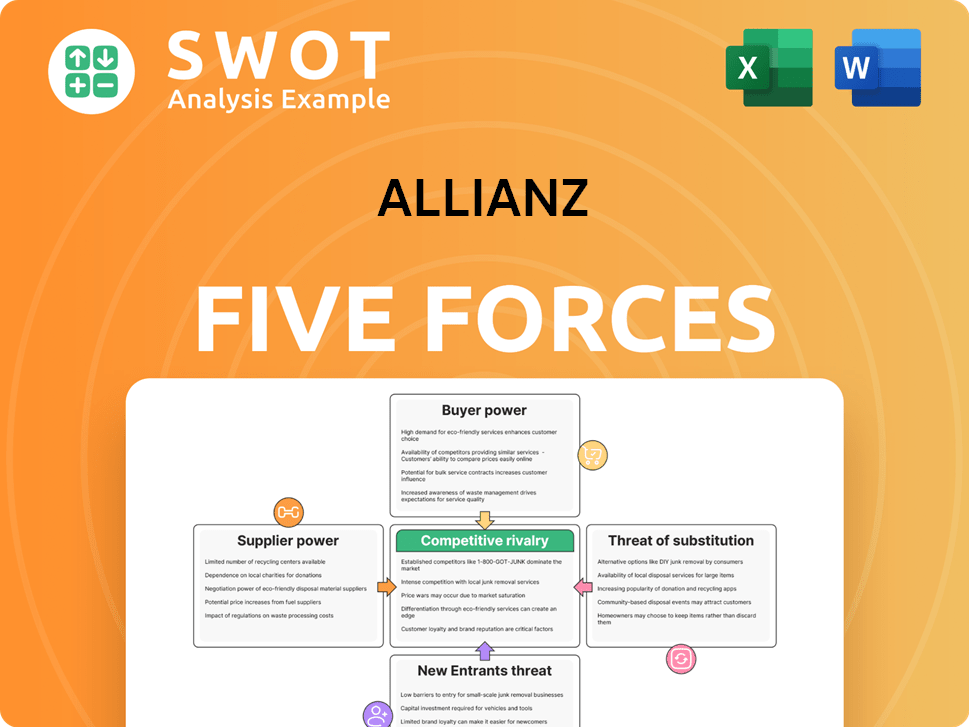
Related Blogs
- What are Mission Vision & Core Values of Allianz Company?
- What is Growth Strategy and Future Prospects of Allianz Company?
- How Does Allianz Company Work?
- What is Sales and Marketing Strategy of Allianz Company?
- What is Brief History of Allianz Company?
- Who Owns Allianz Company?
- What is Customer Demographics and Target Market of Allianz Company?
Disclaimer
All information, articles, and product details provided on this website are for general informational and educational purposes only. We do not claim any ownership over, nor do we intend to infringe upon, any trademarks, copyrights, logos, brand names, or other intellectual property mentioned or depicted on this site. Such intellectual property remains the property of its respective owners, and any references here are made solely for identification or informational purposes, without implying any affiliation, endorsement, or partnership.
We make no representations or warranties, express or implied, regarding the accuracy, completeness, or suitability of any content or products presented. Nothing on this website should be construed as legal, tax, investment, financial, medical, or other professional advice. In addition, no part of this site—including articles or product references—constitutes a solicitation, recommendation, endorsement, advertisement, or offer to buy or sell any securities, franchises, or other financial instruments, particularly in jurisdictions where such activity would be unlawful.
All content is of a general nature and may not address the specific circumstances of any individual or entity. It is not a substitute for professional advice or services. Any actions you take based on the information provided here are strictly at your own risk. You accept full responsibility for any decisions or outcomes arising from your use of this website and agree to release us from any liability in connection with your use of, or reliance upon, the content or products found herein.